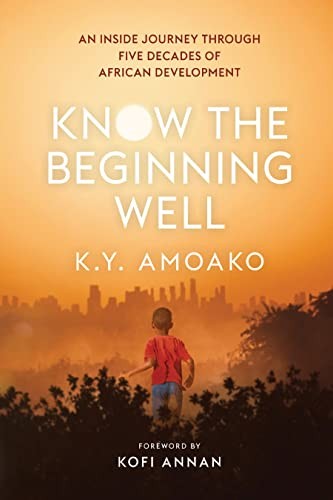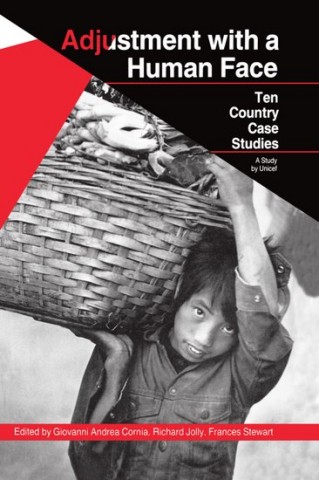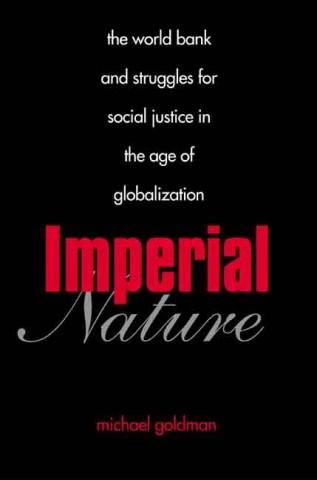The World Bank is a favorite target of criticism. Yet, few actually know how the massive organization operates, externally or internally. Michael Goldman set out to do present this information, and specifically in the context of the 'greening' of the World Bank (or its development and promotion of "green neoliberalism") and its funding whereby it had "to come to terms with the environmentally and socially deleterious effects of its projects" (p. 7). The book "Imperial Nature: The World Bank and Struggles for Social Justice in the Age of Globalization" (2005) was the result. The author was driven toward the study by a pervasive praise of development while his own experiences were the opposite: "Whereas I am regularly told that the project of development uplifts the poor and restores the environment, too often I see it impoverishing the majority and enriching the few." (p. x).
In the book, Goldman attempts "to capture and explain the ways in which the World Bank and its partners have worked to create a representation, analysis, and mode of action for the project of development that have become naturalized, legitimate, and durable. I show through ethnographic research how, in response to effective organizing efforts of its critics, the Bank has successfully worked to reinvent itself, tame its critics, and intervene in an ever-growing number of institutions, terrains, and social bodies located across the postcolonial map" (p. 5). A methodological shortcoming, as a self-described ethnography (p. 5) and critical ethnography (p. 25), there was sparse information on what the data collection entailed or reflexivity of the process – beyond sitting in on workshops, conducting individual interviews with staff and visiting projects in one country. The reader does not gain a sense of the extent of the qualitative methods used, or if they are representative of the Bank (or ethnographic in approach). Nonetheless, the book is insightful and is well worth a read for those interested in knowing how the World Bank operates.
One of the common criticisms waged against the World Bank presents a picture of a monolithic power imposing its will upon the globe. While Goldman is critical of the Bank, he offers important nuance in the critical discourse: "People simply do not agree or consent, or fully stand with or against universal notions of progress, development, and modernization. They do not build up the scientific case for a tropical highway or pour the concrete for a megadam without some reflection, reservation, or fight. If we always assume its success or failure without first looking at how hegemony is constituted, we lose all sense of why people offer their consent without force, and why they do not. We lose the ability to discern where the political openings are, the sites and spaces where dominant structures get constituted, how people try to subvert them, and from where alternatives arise" (p. 25). This is an important addition to understand how the Bank imposes and how it is resisted, but lacking from Goldman's narrative is the role of nation-states, as sovereign countries seeking (or at least approving) World Bank projects and packages. Many countries have resisted and rejected the World Bank, and are a loci of important power in-between the international financial institution and the people of the nation. Yet, Goldman tends to focus upon the relationship between people and the Bank, and under explores the important role of governments.
One of the interesting arguments developed by the author is around how the World Bank seeks to dominate the norms and trends of international development ideas, writing that "data collection and analysis, report writing, editing, and the nail-biting process of getting approval from one's superiors (and one's superiors' superior) is less a process of discovery, creativity, and refutation than one of manufacturing consent. From hiring practices, to hierarchical pressures, to funding decisions for research, to the way information flows are manipulated internally and externally, the assembly line of knowledge production is studded with cultural practices of social control as well as incorporations and hegemony-building" (p. 148-149). Later, in the country case study, Goldman continues this train of thought: "with omission there is inclusion; for every concern, data set, interpretation, and recommendation that is omitted or removed from a report, there are as many that fill its pages and circulate as science locally and oftentimes transnationally" (p. 169). This manufacturing of consent is particularly vivid in the case of community consultations, where one independent researcher found that those consulted had little to no idea of what was even being discussed in the meeting, of often held completely different ideas of what was being proposed and approved (p. 172).
Although the book was written in the early 2000s, it provides interesting insight into what would become normalized in the decade that followed the publication of this book: "Since 9/11, the Bank has been compelled to redirect its finances to a handful of countries supporting the U.S. war. In 2002, the World Bank put together loans for an unprecedented $800 million to Pakistan, $2.2 billion to India, and $3.5 billion to Turkey, much of which appears unconnected to plans the Bank had before September 2001. Countries in southern Africa suffering from horrible famine received little financial support. In 2004 and 2005, the Bank's flagship investments have been Afghanistan and Iraq. The future of the Bank seems to be in the mopping up of the destruction caused by the U.S. military, the rebuilding of societies in the name of antiterrorism, development and democracy." (p. 275). Goldman does not explore who most benefits from these shifts and new financial packages, but other works, such as Rashid's Descent into Chaos, does.



